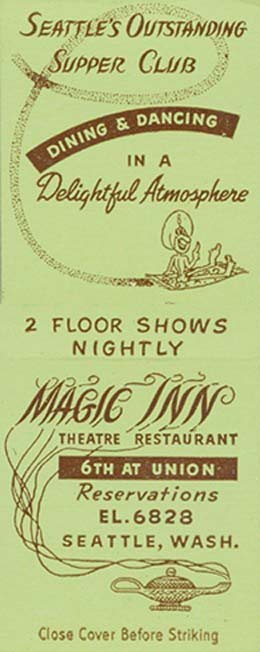On Friday and Saturday nights, October 16 and 17, 1964, Seattle's Magic Inn nightclub, located at 6th Avenue & Union Street downtown, hosts the famed 1950s rhythm & blues singer Little Willie John (1937-1968) for a rollicking weekend engagement. His arrest for homicide by the Seattle Police Department early Sunday, some hours after the second show, makes that gig among John's last performances.
You Give Me (Fever)
William Edgar John is best known for his classic 1956 No. 1 R&B hit “Fever,” but his recording career had begun as the featured vocalist on the Paul Williams Orchestra’s 1955 tune, “Betty Ann (Ring-A-Ling).” Signed to the Cincinnati-based King Records in 1955, John’s early hits included 1958’s Top-20 pop gem, “Talk To Me, Talk To Me,” 1959’s No. 13 R&B hit “Leave My Kitten Alone,” and 1960’s No. 13 pop smash, “Sleep.” In the late-1950s he toured widely (along with an opening act, the up-&-coming James Brown and his band) and John racked up 14 best-selling hits up into 1963.
Long popular in the Pacific Northwest due to his years of touring through the region’s R&B rooms including Portland’s Cotton Club, Olympia’s Evergreen Ballroom, and Seattle’s Eagles Auditorium, John arrived in the fall of 1964 with a troubled mind. A diminutive (5' 4'') man with a titanic temper, he’d recently skipped bail in Miami, Florida, after assaulting a man with a broken bottle in August and his self-destructive ways continued at the Magic Inn gig. We don’t know how his Friday night performance went, but an old local pal, musician Little Bill Engelhart, has recalled that John was already “way drunk” onstage that Saturday night of October 17th -- he was so inebriated that Engelhart wisely passed on an offer to go out and party with the R&B star after the gig.
Doin’ The Birdland
John carried on though, heading out with his chauffer/valet/runnin’ buddy to have a few drinks at a notoriously wild after-hours nitespot, the Birdland (2203 E Madison Street). Once there, John jumped up on stage to sing a few tunes with the house band, and eventually left to party on with a couple local women. On Sunday their festivities moved over to an illicit after-hours den in a Central Area house (918 23rd Avenue), where a brawl erupted. After the singer was punched in the mouth by a huge (6’ 2” / 200 pound) ex-con railroad worker named Kenneth Roundtree, he responded by stabbing his attacker with a knife.
Initially arrested for murder, those charges were soon reduced to manslaughter (based on the how physically out-matched John had been) at a trial that began in January 1965. Found guilty, John made his $10,000 bail and appealed the verdict for 18 months -- finally upon being sentenced to serve 8-to-20 years, John entered the forbidding Walla Walla State Penitentiary on July 6, 1966.
R-e-s-p-e-c-t
During his incarceration John reportedly got into a few more fights, was abused by guards, made some new buddies, wrote songs, and even performed a number of times for his fellow inmates. Among the notables who reportedly made the pilgrimage to Eastern Washington to show their respect for their old friend and try to cheer him up were singing stars Aretha Franklin and James Brown.
It was after reporting to the infirmary with pneumonia and then being locked into a Maximum Security isolation room that John died on May 26, 1968, at the age of 30. His official death certificate stated the cause as being a “heart attack.” Others suspected he’d been beaten, and some have stated he expired from neglect. James Brown -- who in 1968 recorded an entire tribute album titled Thinking About Little Willie John and a Few Nice Things – was among those who believed his old friend had simply died of a broken heart.
Little Willie John’s highly emotional music was loved by fans and respected by fellow musicians, many of whom have recorded their own renditions of his tunes -- ranging from the Beatles’ “Leave My Kitten Alone” (1964), to Madonna’s “Fever” (1992).

